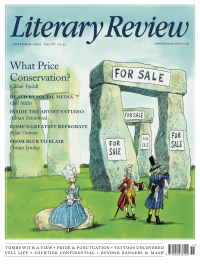Simon Briscoe
Damned Statistics
Bad Data: How Governments, Politicians and the Rest of Us Get Misled by Numbers
By Georgina Sturge
Bridge Street Press 288pp £20
Laugh or cry? This was the dilemma I faced as I read this excellent book. Having spent much of my working life crawling over statistical series and data sets to find out if they accurately reflect the real world, I was familiar with many of the vignettes here. But I enjoyed the fresh take on old tales and was happy to become acquainted with some new ones.
Crime stats, school rankings, figures on drinking, obesity, life expectancy, work, tourism, sex and more: there’s something here for everyone who wants to better understand the limits of our knowledge about the country. Did you know, for example, that much of (or possibly all) the rise in some categories of recorded crime in the last decade is due to new reporting methods, introduced after the old methodology was declared unfit for purpose? Or that the latest rise in the number of rapes reflects the effects of high-profile cases and campaigns on victims’ willingness to report incidents? Bad Data also provides a good explanation of how differences in methodology often muddy the message. For example, statisticians have said that the crime survey figures collected during the pandemic – derived from phone interviews – are not comparable with the figures collected from face-to-face interviews before and after the pandemic. So does anyone actually know what has happened to crime in the last decade? We are reminded not to fall for the ‘what you see is all there is’ fallacy, where people assume that what you have in front of you is enough to explain what appears to be happening. Our government statisticians should be aware of this, yet seem frequently to fall into the trap.
The book deals well with those things, such as poverty, which are tricky to pin down in statistical terms. Perhaps the most striking chapter is the one about issues for which there is barely any data. Why is it that we have no statistics about the extent of illegal

Sign Up to our newsletter
Receive free articles, highlights from the archive, news, details of prizes, and much more.@Lit_Review
Follow Literary Review on Twitter
Twitter Feed
Literary Review is seeking an editorial intern.
Though Jean-Michel Basquiat was a sensation in his lifetime, it was thirty years after his death that one of his pieces fetched a record price of $110.5 million.
Stephen Smith explores the artist's starry afterlife.
Stephen Smith - Paint Fast, Die Young
Stephen Smith: Paint Fast, Die Young - Jean-Michel Basquiat: The Making of an Icon by Doug Woodham
literaryreview.co.uk
15th-century news transmission was a slow business, reliant on horses and ships. As the centuries passed, though, mass newspapers and faster transport sped things up.
John Adamson examines how this evolution changed Europe.
John Adamson - Hold the Front Page
John Adamson: Hold the Front Page - The Great Exchange: Making the News in Early Modern Europe by Joad Raymond Wren
literaryreview.co.uk